Profile
Meet Mrs. Victoria Nyamapho Zormelo Paintsil – woman of substance, retired educationist and chorister at age 90
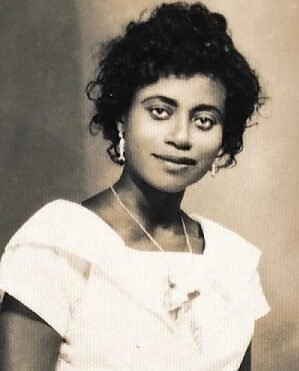
Senior citizens say “old people are just young people who have been alive for a very long time and that the longer you live, the more beautiful life becomes.”
These expressions, to a great extent, suit Mrs. Victoria Nyamapho Zormelo Paintsil, a retired educationist and an accomplished woman who is grateful to God for sustaining granting her strength for nine decades and still counting.
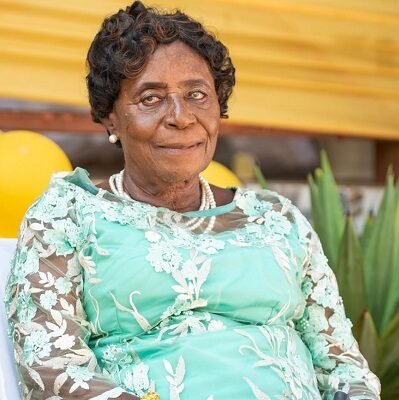
Unusual of nonagenarians like her, she has never been on any medication for diabetes or hypertension. She has all her senses intact, able to walk, talk and read without spectacles.
Her “only physical challenge” is a chronic osteoarthritis which she says “cannot even stop” her from “climbing the staircase to robe in the choir or to dance.”
Prior to celebrating her 90th anniversary on August 4, 2022, she had written an autobiography she describes as “a true reflection of her character and personality.”
Background
Mrs Paintsil, in an interview with The Spectator last Friday, touched on aspects of her life and career, her personal values and some nuggets of wisdom she believes should guide young people in the journey of life.
Born on Thursday, August 4, 1932, to Madam Emelia Akoeley Zormelo and Togbi Godfred Nyavor Zormelo of Tegbi in the Volta Region, she had 18 paternal siblings made up of 11 males and seven females.
According to her, her mother was returning from Togo to Saltpond in the Central Region when she went into labour whilst on transit at Nsawam in the Eastern Region.
“Being a traditional birth attendant, my mother delivered by herself and brought the baby to Saltpond the next day on board a wooden truck by name “Accra Bode.” My father, therefore, nick-named me “Bode” after the truck which conveyed me to Saltpond.
“As the last born of my parents, I was pampered and equally disciplined. I suffered and endured a lot of knocks on my head because I was very naughty,” she recounted in her biography.
Education
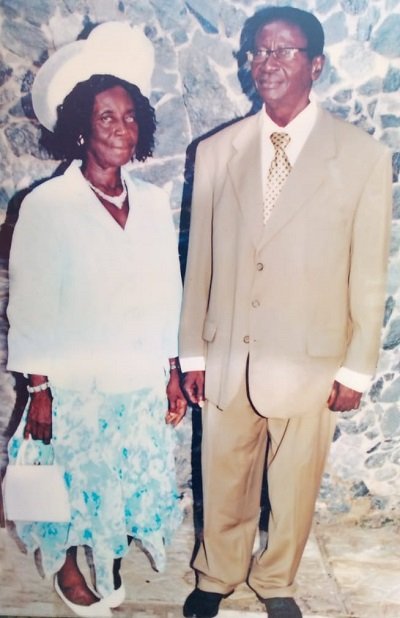
The mother of five attended T.I Ahmadiyya School at Saltpond and completed Standard Seven with distinction in 1949 as the only girl in a class of 30 pupils.
In 1956, she enrolled at the Emergency Training College at Saltpond for six weeks as a Pupil Teacher Trainee and was subsequently appointed a Pupil Teacher at Kormantse Methodist Primary School.
After obtaining Teachers Certificate ‘A’ at Wesley College, Kumasi in 1960, she was posted to Saltpond Methodist Middle School at Appiakwaa where she started as a Junior Teacher and rose through the ranks until her retirement in the year 2000 as a Principal Superintendent.
While teaching at Kormantse Methodist Primary School, she got married on September 16, 1962, to Mr. Ebenezer Ayew Atta Paintsil, who encouraged her to choose teaching as a profession but her husband passed away on August 13, 2011, after nearly 50 years of marriage.
Values
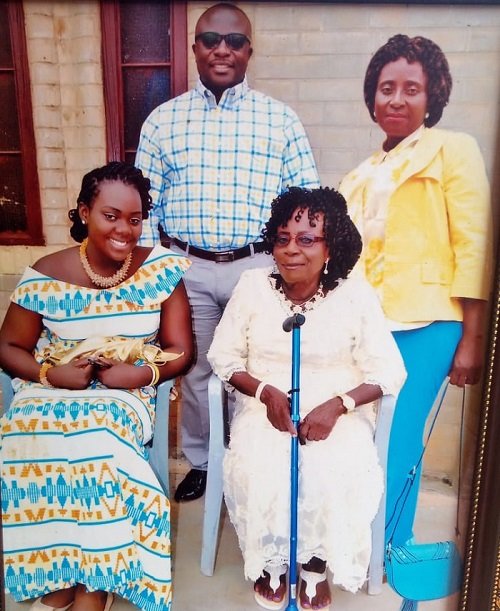
Highlighting some of her personal values, the outspoken grandmother now the only surviving child of her parents, said she respected everybody and did not envy or hold grudges against anybody.
“I don’t think I have a grudge with anybody. If you do something I don’t like I tell you instantly. I tell people that everybody is unique in their own way so nobody should look down or discriminate against the other.
“I spend time thinking about God instead of being bitter or holding grudges against people. If I hold iniquities in my heart, God will not answer my prayers,” she noted.
This and many other attributes, she believes, account for the many years of blessings she continues to enjoy on earth.
Teaching
Mrs Paintsil, with over 40 years teaching experience, said she was “born to be a teacher because she loves talking and disciplining people.”
Her career took her to Methodist Middle School Saltpond (1960-1969); Kormantse Methodist Primary School (1969-1992); Kormantse Hasowodze D/C Primary School (1992-1996) and Kormantse Methodist Primary School (1996-2000).
Some of her pupils, she said, included Mr Stephen Asamoah Boateng (Asabee), Chief Executive of SIGA; Nana Kwame Ayim, Adontenghene of Mankessim Traditional Area, and Mr Lious Turkson, a banker.
A good instruction she always gave her pupils, according to her, was the need to be cautious of personal conduct in the midst of a crowd. She said the fact that “you are in a crowd does not mean you can misbehave or do bad things and get away with it.”
“You must not forget you are an individual and when you are caught acting wrongly among the crowd, you will be on your own,” she stressed.
Christian life
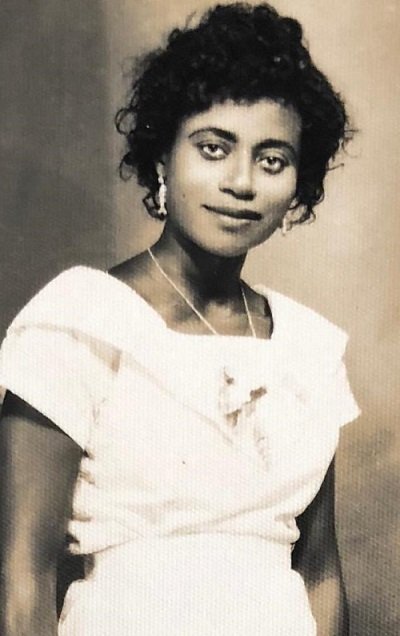
As a staunch member of the Saltpond Wesley Methodist Church, she became a chorister in 1949 and served in various capacities, as a Treasurer, Lay Reader and Representative of the Choir at Leaders Meetings.
The disciplinarian who loves reading and having good conversations said she would want to be remembered as a “fearless, outspoken, forthright, and a happy-go-lucky person.”
“I don’t know who my enemies are and I do not hate anybody,” she stressed. She has, therefore, instructed her family not to prescribe any funeral cloth when she departs for the world of her ancestors.
She said everybody should “come in all-white or any black and white presentable attire, have fun, be glad in the Lord, and release a lot of white balloons.”
Mrs Paintsil has 14 grandchildren and one great grandchild. Her children are Paapa Paintsil, a Sports Consultant; Madam Jane Paintsil, an Educational Consultant; Mr. Felix Paintsil, Healthcare and Biomedical Practitioner; Mr. Ben Paintsil of Currier and Bulk Haulage Consultancy — all of them based in the United States of America, and Dr. Victor Paintsil, Dental Surgeon at Tarkwa Municipal Hospital in the Western Region.
Her siblings include Mrs. Victoria Zormelo-Gorleku, the first female Director of the Ghana Prisons Service; Rev. Sir George Zormelo, Jane Adakyivor Zormelo (all deceased) and many others.
By Ernest Nutsugah
Profile
Edwina Anokye-Bempah Redefining Trust in Ghana’s Real Estate Landscape

Every morning begins the same way for Edwina Anokye-Bempah, with quiet devotion. It is her grounding ritual, a moment of reflection and gratitude before she steps into the dynamic, often unpredictable world of real estate brokerage.
By the time she arrives at the office, she has already set the tone for her day. She reviews the previous day’s tasks, checks what was accomplished and what still needs attention, and then drafts a new to-do list. For her, success is rooted in deliberate planning, discipline, and the commitment to follow through.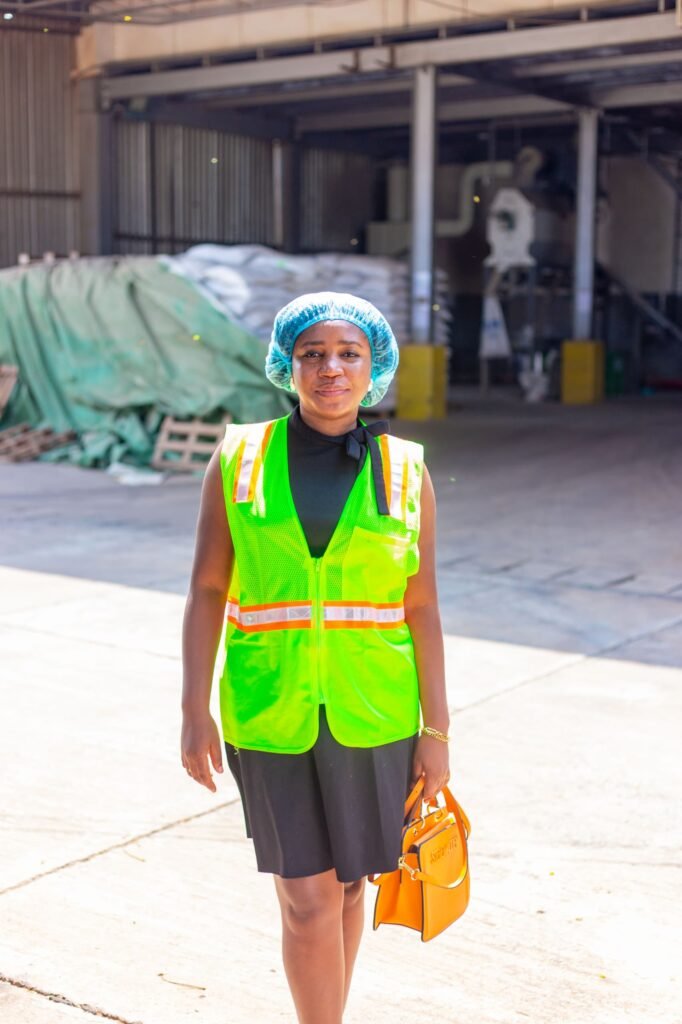
Today, Edwina stands out as one of Ghana’s promising real estate brokers, but she is also clear about the distinctions within her field. While many people casually use the term ‘realtor,’ she is quick to explain that only professionals registered with the National Association of Realtors can claim that title.
“Since I am not registered with the association, I am a real estate broker,” she says. It is a role she embraces wholeheartedly, facilitating transactions, connecting buyers and sellers, and ensuring clarity and integrity at every step.
Her journey into the industry took shape at MeQasa, an online platform dedicated solely to real estate. The platform exposed her to developers, agents, and the complexities of property transactions. She worked closely with developers and observed one recurring problem: clients often complained about agents who failed to respond, follow up, or provide accurate information.
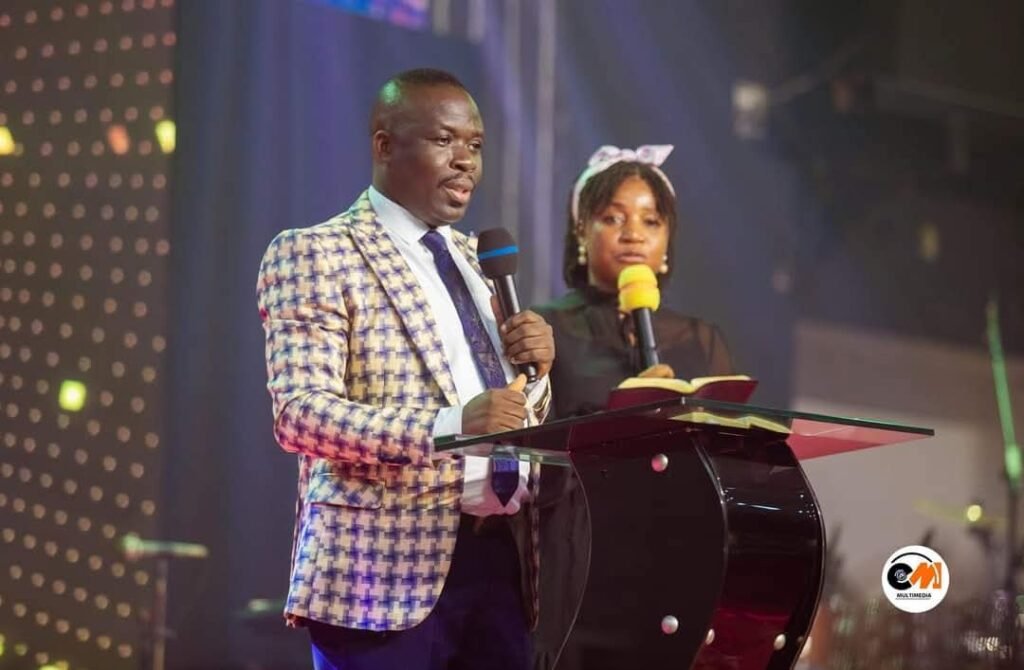
With her background in sales and marketing, Edwina felt naturally drawn to the field. It was an industry where she believed she could make a meaningful, positive impact. Real estate, she came to learn, is far more than brick and mortar. It is about helping people secure one of the most important investments of their lives. This understanding shapes every decision she makes.
One of the most challenging tasks in her work is qualifying clients.
“A serious buyer must be willing, ready and able,” she explains. When one of these three qualities is missing, the transaction is likely to stall or collapse entirely.
On the seller’s side, due diligence is equally critical. Ownership disputes, land fraud, and unclear documentation remain some of the biggest risks in Ghana’s real estate sector.
Edwina understands the weight of the responsibility she carries. “The money involved is huge. These are people’s lifetime savings. Most people buy one home or maybe two in their entire lives. You cannot afford to make a mistake.”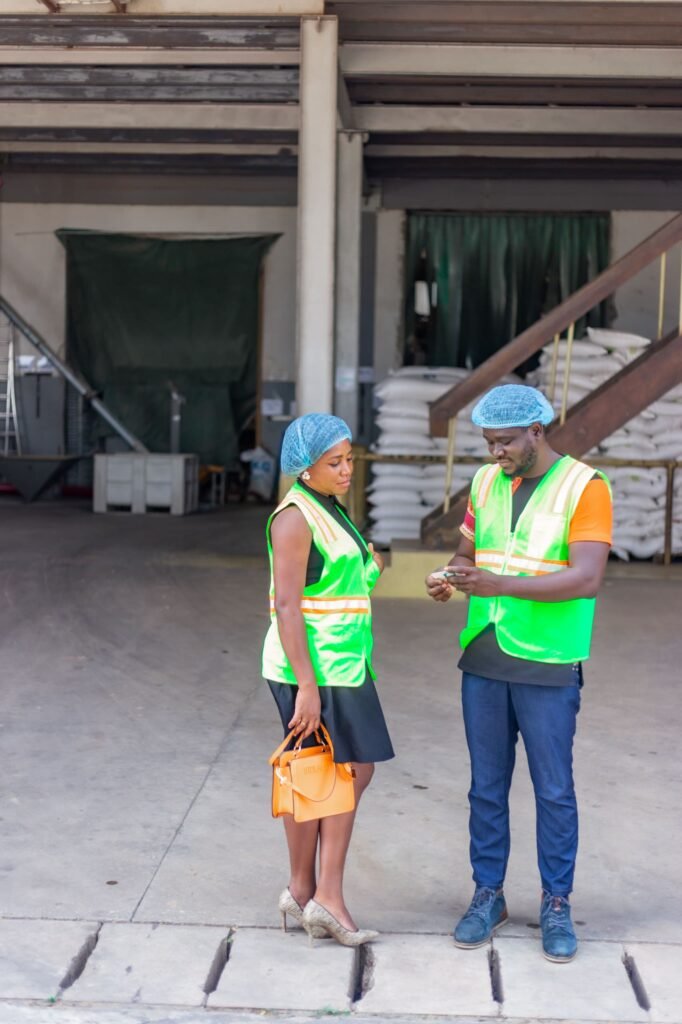
Working in what many describe as a male-dominated field has never intimidated her. With an MBA in Marketing and extensive experience in sales roles including a stint as an Account Manager in an advertising agency, she has grown comfortable handling clients, negotiating deals, and presenting herself with confidence.
“My gender has never discouraged me,” she says. “What matters is hard work and ensuring that the client’s needs were met.”

The only occasional challenge, she admits, was maintaining professional boundaries when some men attempt to be overly familiar. Her solution is simple: stay professional and do not over-familiarise yourself with clients.
Her educational journey started in Kumasi, followed by Yaa Asantewaa Girls’ Senior High School, where she studied Agricultural Science. She continued the same at the University of Ghana before pursuing her master’s degree. After university, she worked on her uncle’s poultry farm before moving into advertising. Later, her role at MeQasa finally opened the door to the career she had long been unknowingly preparing for.
Over the years, Edwina has built a reputation not only for competence but also for care. She recalls one client in particular, an older man relocating to Ghana with no family in the country. After helping him secure two homes, she became the closest person he could rely on. One evening at around 8 p.m., he called to say he felt unwell. Without hesitation, she drove to his home and rushed him to the hospital. Doctors later told her that any delay could have been fatal.
For Edwina, that moment affirmed that the job goes far beyond selling property. “It doesn’t end with the sale,” she says. “You have to look out for people.”
Her influence also extends to younger people observing her journey. She is known for her tenacity, her refusal to give up on clients or tasks, and her resilience in the face of challenges. Those who work around her learn to push forward regardless of setbacks.
“If a deal doesn’t go as expected, you don’t look back. You find a way.”
Beyond real estate, Edwina serves as an interpreter in her church, a role that dramatically boosted her confidence. What began with trembling legs has evolved into a boldness that reflects in her public speaking and client interactions. She credits her growth to God, her senior pastor, her mother, siblings, friends, and her dedicated team — “an amazing circle,” she calls them.
Today, she is also a partner in a showroom business dealing in vanity units, sanitary wares, and tiles, an extension of her real estate insight and experience.
For young people aspiring to join the industry, her advice is clear: “Learn the industry beyond selling. Understand transactions, build strong relationships, and always do your due diligence.”
For Edwina Anokye-Bempah, real estate is more than business; it is trust, service, and impact, one client at a time.
By Esinam Jemima Kuatsinu
Join our WhatsApp Channel now!
https://whatsapp.com/channel/0029VbBElzjInlqHhl1aTU27
Profile
How a Collapsed Dream Birthed Another: Daniel Debrah’s Music Journey

From the age of five, Daniel Nana Kwesi Kakra Debrah has lived a life surrounded by rhythm, harmony, and the quiet pulse of music. Growing up in a home where instruments filled corners and rehearsals were as normal as conversation, Daniel’s first teachers were not in formal classrooms—they were the sounds, movements, and discipline he absorbed from his father, a committed church musician.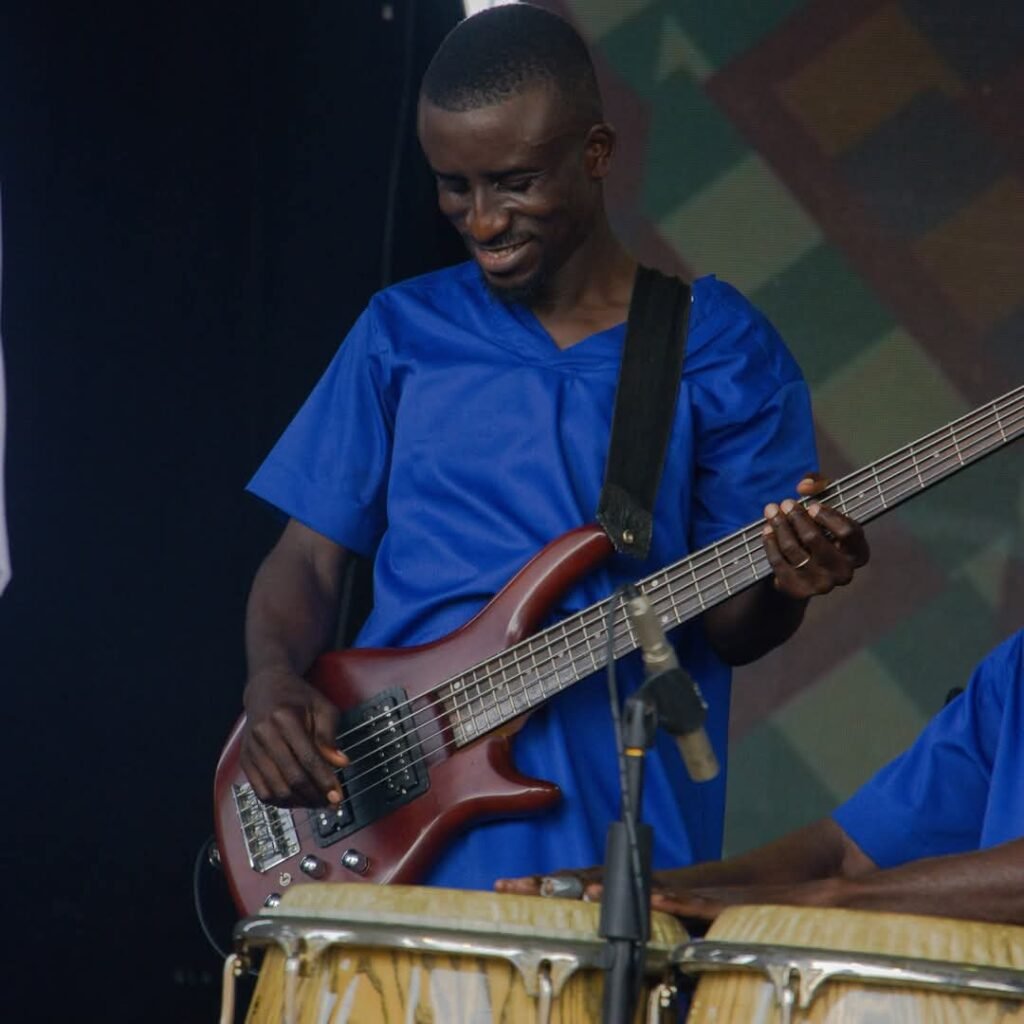
Ironically, music was not Daniel’s first dream. Like many young boys, he once hoped to become a professional footballer. But an injury from a school match left him unable to walk for three months, forcing him to retire that ambition. What seemed like a tragedy at the time became the turning point that aligned him with the path he was always meant to follow.
Daniel’s earliest musical expression began in church. As a boy in Sunday School, he eagerly ‘pounded’ the drums, quickly becoming known as the child who never missed an opportunity to play. Even in Senior High School (SHS), although many of his classmates were unaware of his talent, he continued practising quietly until completing school in 2005.
After SHS, Daniel joined a church music class with the intention of growing as a drummer, but one moment changed everything. Watching a bass guitarist perform stirred something in him. Drawn to the deep, steady tones of the bass, he persuaded a friend to teach him the basics. With no instrument of his own, Daniel practised at home using a broken guitar for more than eight months.
Then destiny intervened. The church’s lead bassist was suddenly suspended, and Daniel stepped in voluntarily during an evening service. That temporary voluntary act became permanent as he was asked by the then Music Director to fill in the gap. From that point, he embraced the bass guitar fully—a decision that defined the rest of his life.
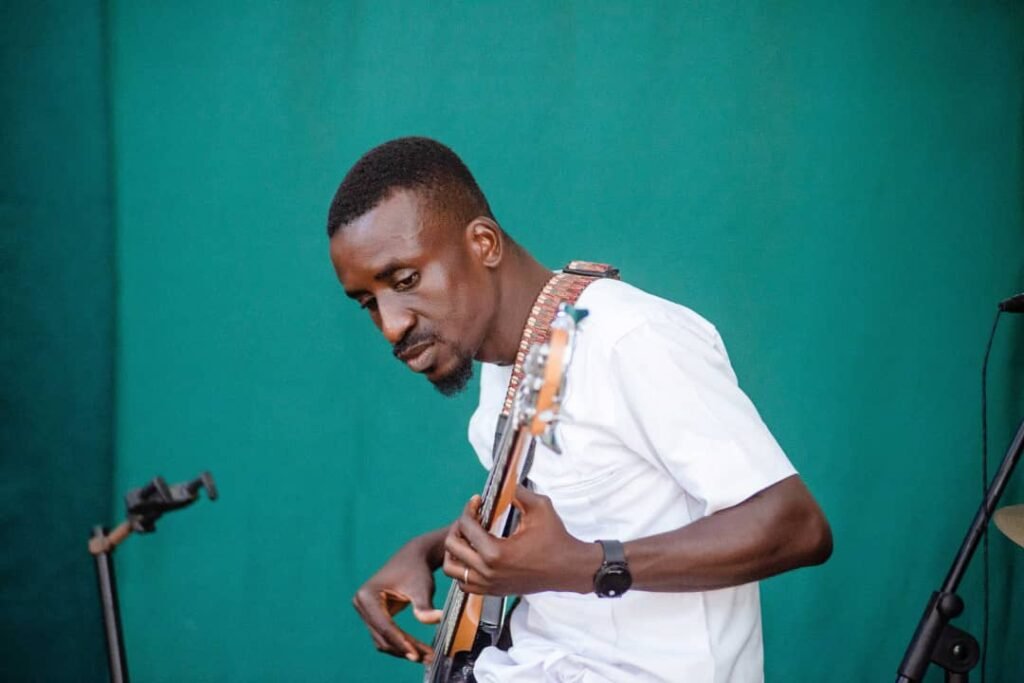
Around 2006, Daniel made a life-changing decision to take his craft seriously. He began practising for hours on end, sometimes up to eight hours a day, often without food, locked away from family and friends, perfecting techniques and expanding his creativity. While others assumed he was outdoors socialising, Daniel was indoors sharpening his gift.
His breakthrough came in 2007 when he performed in the TV3 Bands Alive competition. The exposure, applause, and feedback confirmed his dream: “music was not just a passion; it was his calling,” he said.
With time, Daniel moved confidently into the professional space. He performed at studio sessions, live concerts, weddings, church events, and high-profile national programmes. His talent, discipline, and reliability earned him a reputation that continues to attract respected gospel artistes.
Today, he works closely with Daughters of Glorious Jesus, Chris Apau, and Israel Ofori, who have been of immense help to his career ministry. He also collaborates with several ministries and offers support with musical arrangements, live performances, and studio recordings.
Beyond the stage, Daniel sees himself as a mentor. Many young musicians reach out to him, some visiting in person, others calling for guidance. Whether through hands-on training or virtual coaching, he is always ready to teach. For Daniel, music is not just technique; it is character, discipline, and values. He believes a musician must carry integrity both on and off stage.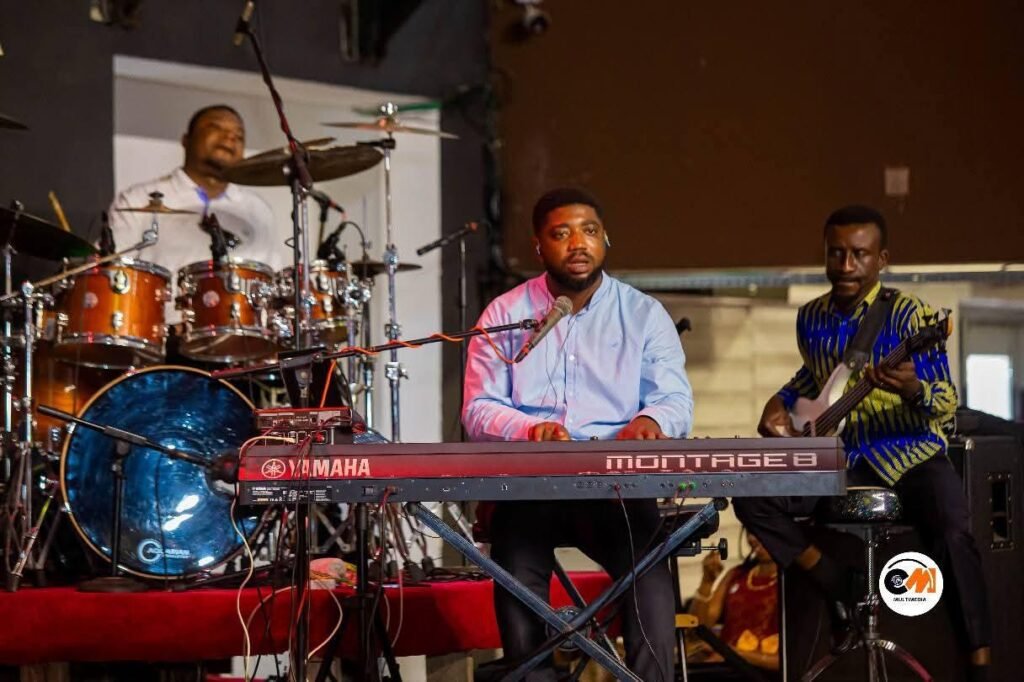
Like many musicians in Ghana, Daniel has faced challenges with delayed payments and broken agreements. These experiences have taught him to value professionalism. He now insists on part payment upfront and charges more for his services, a decision grounded in self-respect and fairness.
Daniel’s journey in music has been shaped by various individuals who have supported him at different stages of his career. He acknowledged Opoku Agyeman Sanaa, Kofi Ennin, Andrew Klu, Mr. Samuel Abbey, Mr. Samuel Sarpong Agyei, Paul Quartey, Mr. Nene Emmanuel, and Mr. Isaac Asiedu, saying that their belief in him continues to inspire his journey.
Daniel’s work is guided by his Christian faith. He sees music as ministry, not merely entertainment. Off stage, he is a devoted family man—a husband and father of two, a boy and a girl, who have also started playing musical instruments. During his leisure time, he listens to music, or plays football and action video games.
Through his acts of service and unwavering determination, Daniel continues to inspire others, proving that when passion meets integrity, ordinary men impact the lives of others.
By Esinam Jemima Kuatsinu







